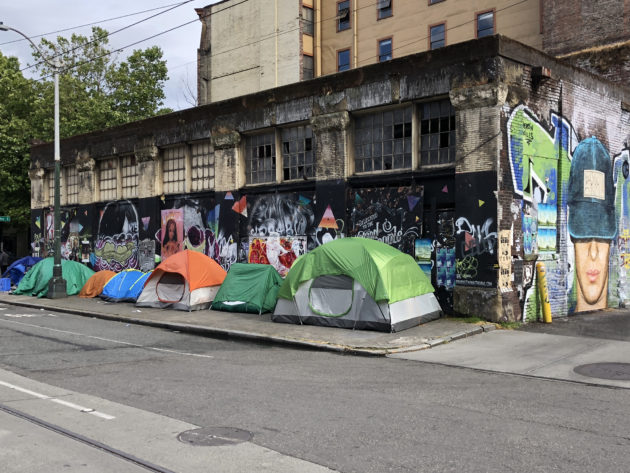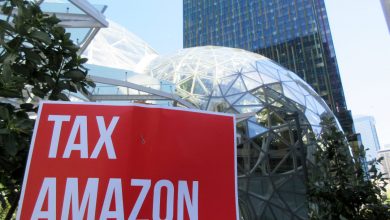Compassion Seattle initiative qualifies for ballot: Will it change the downtown business outlook?

As downtown Seattle tech businesses implement plans to return to offices that have been vacant for more than a year, a change in how some of these companies experience downtown could be on the horizon.
Supporters announced Wednesday that the Compassion Seattle ballot measure has qualified for the November ballot. It kicks off what is likely to be a fight about how a progressive city deals with a chronic homelessness crisis and tries to keep residents and business leaders happy while improving the lives of the city’s thousands of unhoused.
“Charter Amendment 29 has broad support across Seattle and among Seattle’s business community,” said Downtown Seattle Association President & CEO Jon Scholes. “We anticipate there will be growing interest in supporting this campaign now that we’ve qualified for the November ballot because Seattleites see a homelessness emergency that’s not been solved and is only getting worse.”
If the ballot measure is approved by Seattle voters — internal polling by its backers is purported to show that it still retains strong support among respondents — the amendment essentially bypasses the City Council and, for the first time, adds specific benchmarks and responsibilities to Seattle’s sometimes confusing, competing, and decentralized array of homeless services and programs.
Most controversially, the charter amendment would require the city to keep “parks, playgrounds, sports fields, public spaces and sidewalks and streets clear of encampments” once the mandated housing, drug, and mental health services are in place.
It is this section that detractors say criminalizes homelessness, while supporters counter that it for the first time makes the city engages in the tent clusters in neighborhoods such as downtown Seattle where an estimated 2,000 homeless people currently live.
“(Voters) want an accountable, compassionate plan to get people inside and on the path to stability, and to open our parks and public spaces. This is what Charter Amendment 29 offers,” Scholes added.
The measure also mandates that Seattle offer access to behavioral health programs along with housing. Housing, under the charter amendment, could include “enhanced shelters, tiny houses, hotel-motel rooms, other forms of non-congregate emergency or permanent housing.” For example, under the proposed changes, the city would be legally required to provide an additional 2,000 units of emergency and permanent housing within one year of the amendment’s January 2022 start date.
In a recent GeekWire Civic Conversation about Compassion Seattle, Kieran Snyder, co-founder and CEO at Textio, and 2021 GeekWire Awards winner for CEO of the Year, said that as a business owner who had most of her staff in downtown Seattle prior to the pandemic, the part of the initiative that she finds compelling is the expansion of services that don’t involve law enforcement.
“The notion of investing in housing and support services that are independent of law enforcement, that’s the thing that makes [Compassion Seattle] a promising set of solutions,” she said. Snyder said local businesses should also find a way to help pay for additional housing and services.
But some have said any effort is too little, too late. Seattle startup Ad Lightning, for example, exited its downtown Seattle lease last year and doesn’t plan to return.
“What I’ve observed particularly the last five to 10 years is an attitude in Seattle that I would characterize as anti-business, and kind of anti-job, and that certainly has accelerated in the last few years,” Ad Lightning co-founder Scott Moore said on a recent GeekWire podcast. “And it’s unfortunate.”
Other companies, regardless of the measure’s success, plan on returning to downtown.
In June, Geekwire surveyed a handful of tech company leaders via email about their return-to-office plans in downtown Seattle. Some companies remain committed to downtown Seattle and are excited to return and be part of the revitalization process.
Karen Clark Cole, CEO of UX company Blink, said prior to the pandemic she had 80 employees downtown. That number dropped to four employees at the pandemic’s height. But by September, she estimated the company might have 10% of its employees back in the office.
“We have not considered moving or downsizing our office,” she said. “[Blink] will gradually start requiring people to come in for collaboration sessions, team meetings and to meet with clients.”
Moreover, she said, the company plans to expand its downtown workforce. “We grew during 2021 (only about 4%) and will continue to grow,” she said, adding that Blink will require all of its in-office employees to be vaccinated. “There will be more people assigned to the downtown Seattle office, but most people will be part-time so not everyone will be there at once.”
Conclusion: So above is the Compassion Seattle initiative qualifies for ballot: Will it change the downtown business outlook? article. Hopefully with this article you can help you in life, always follow and read our good articles on the website: Ngoinhanho101.com





